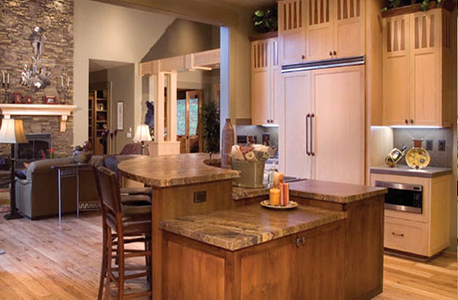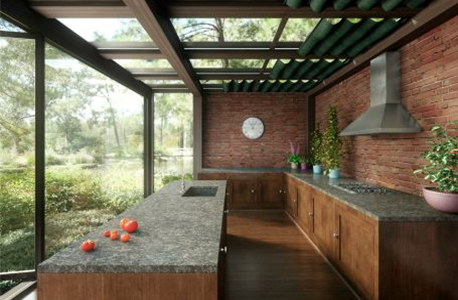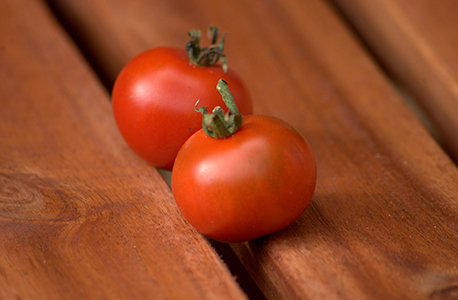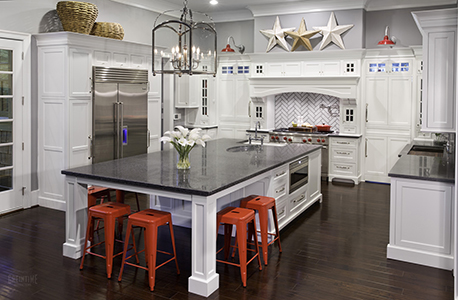
Cabinetry
The Problem: Conventional cabinets are a large source of VOCs (Volatile Organic Compounds) in the kitchen, since most brands use some kind of MDF, pressed wood, plywood or particleboard, which contain formaldehyde – a VOC – as a disinfectant. These types of cabinets use the chemical to avoid warping.
Potential Health Issues: Formaldehyde is also found in cigarette smoke and industrial dust, and it is known to trigger asthma and as a carcinogenic.
Solutions: There are several CARB compliant companies that don’t use formaldehyde, often using green plywood or wheat board instead. Other alternatives include wood veneer adhered to a non-toxic substrate, or custom hard wood or even aluminum cabinets.
Warnings: Bamboo is usually touted as a green material (which it is) but for cabinets it may not be the best choice. “The main problem with bamboo is that it’s not straight. Any woodworker would agree that it is a pain to work with bamboo. Plus it does not get stained and only comes in clear and a carbonized version.”.
Countertops
The Problem: VOCs are also commonly found in the glues and solvents used in installing countertops.
Potential Health Issues: Research has shown a wide range of health effects from VOC exposure, including everything from headaches to liver damage.
Solutions: Quartz does not require any sealants like some granite, marble or slate materials though non-toxic adhesives are available for these materials as well. Recycled choices, like glass, are also an option since the VOCs would have evaporated long ago.
Warnings: Always check with the manufacturer about what sealant has been used. “A lot of the products touted as green products are really a gimmick. Recycled glass is no better than any quartz top, and often it is just more expensive.”

Oils, Sealants and Paints
The Problem: Linseed Oil and Tung Oil are some of the most widely used natural finishing oils for wood. While the strong smell comes from naturally occurring VOCs, the oils may be intolerable to clients with sensitivities. Paint might contain VOCs, biocides, solvents, nonylphenol ethoxylates (NPEs) and fungicides – most of which are meant to extend shelf life and prevent mold.
Potential Health Problems: Effects range from eye infections to correlations with reproductive damage.
Solutions: No-VOC paint is a given, and there are even greener choices that have natural sources and a clay or water base. Some wall paints and plaster, like American Clay Plaster, breathe once on the walls and help to create clean air. Other wood sealant options include walnut and hemp oil.
Warnings: Some paint companies fail to list NPEs in their products. Look for third party certifications such as Green Seal or Green Guard for assurance.
Other Considerations
Lighting: Compact fluorescent light bulbs contain mercury – yet another reason to choose energy efficient LEDs instead.
Flooring: Avoid thick carpet for a client with sensitivities, as these can gather dust. Porcelain, cork or wood are safe choices if the sealant has no VOCs.
Appliances: A client with sensitivities will want to avoid gas and propane appliances, so lean towards electric and induction cooktops.
Ready to start your next bathroom project? Let the Experts at PlumbTile Help! Give one of our experts a call at 1-866-369-8180 and receive a discount on your purchase! Also, visit us at www.PlumbTile.com!


